- CEAT
- SportDrive
- CALM Technology
- RPG Group
- Run-Flat Tyres
- Lakshmi Narayanan B
- Renji Issac
- Vishal Pawar
CEAT Gets Ready To Tap Into Premium Passenger Vehicle Market
- By Nilesh Wadhwa
- April 24, 2025
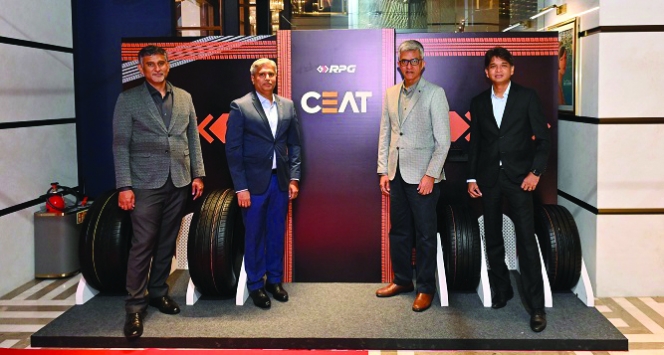
With a fresh onslaught of tyres for the luxury and premium performance vehicles, CEAT furthers its positioning in the PCR segment.
CEAT, the flagship company of the RPG Group, is targeting to be amongst the top 10 tyre makers globally and is outlining an ambitious growth strategy that looks to expand its product offerings across segments and the globe.
On 19 March 2025, CEAT expanded its SportDrive tyre series with the launch of new products targeted specifically for luxury and high-performance passenger vehicles. The idea, however, goes beyond just chasing volumes. The company launched Run-Flat tyres, which withstand punctures and can be safely driven at considerable speeds for up to 80 km before needing repair. This also made CEAT the first Indian tyre maker to roll out such a product in the country.
Furthermore, it has also introduced 21-inch ZR-rated tyres that are designed to handle speeds of up to 300 kmph while also being quieter due to the CALM technology, which utilises special foam inside the tyre.
The question is, what is CEAT looking to gain, given that the Indian premium luxury car market is just a fraction of total passenger vehicle sales?
For context, last year the luxury car segment crossed the 50,000-unit sales milestone for the first time in India. In total, the premium car market saw sales of around 51,200 units in CY2024, which was about six percent higher compared to 48,500 units sold last year. This translates to just about one percent of the total passenger vehicles sales in the country. In comparison, some of the Southeast Asian markets see luxury cars compromise about 5-6 percent of the total car sales, and for markets such as Taiwan, it has reached as high as 20 percent.
CEAT, however, believes that being present in the segment is important. Lakshmi Narayanan B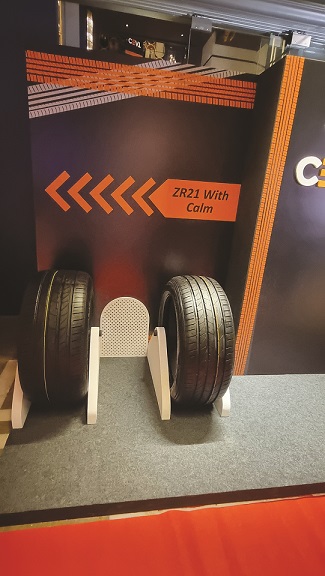 , Chief Marketing Officer, CEAT, told Tyre Trends, “There are two main segments. One is the world of sport SUVs, which includes the 21-inch and larger tyres. Currently, this segment is dominated by imported vehicles, making it relatively small. However, our focus is on establishing our presence for brand stature. The second segment is the luxury ecosystem, where our SportDrive tyres cater specifically to high-end vehicles. This is also where the opportunity for run-flat tyres lies. While we are launching two specific sizes, we see significant potential for expansion.”
, Chief Marketing Officer, CEAT, told Tyre Trends, “There are two main segments. One is the world of sport SUVs, which includes the 21-inch and larger tyres. Currently, this segment is dominated by imported vehicles, making it relatively small. However, our focus is on establishing our presence for brand stature. The second segment is the luxury ecosystem, where our SportDrive tyres cater specifically to high-end vehicles. This is also where the opportunity for run-flat tyres lies. While we are launching two specific sizes, we see significant potential for expansion.”
FOCUS ON R&D
CEAT has been investing significantly towards creating new patents. For instance, in FY2024, the company cumulatively filed 171 patents and spent around INR 1.73 billion in R&D expenditure.
Coming to the recently launched products, the tyre maker has been working on them for over three years. The company’s R&D Centre in Germany and India have worked in tandem to develop world-class products that can meet the needs of the Indian as well as global markets.
“We leverage European strengths while also utilising India’s manufacturing capabilities, which creates a great combination and a significant opportunity for us. Our priority is delivering value to the customer. As we continue expanding within this particular technology, we have introduced three specific deliverables. First, we have the 21-inch ZR-rated tyre, designed for both the Indian and European markets. The German market, especially the Autobahns, requires high-speed-rated tyres, and this offering allows us to cover the entire speed rating ecosystem essential for success there. Second, we have introduced Calm Technology. This technology expands our range into the existing SportDrive and SportDrive SUV segments, which we will continue to develop over time. Third, and most importantly for India, is our run-flat tyre. Our goal is to engage with consumers and provide more relevant value. As we monitor consumer adoption, we will explore opportunities for further expansion,” stated Narayanan B.
It is important to understand, as seen in global trends, that the Indian passenger vehicle segment’s shift towards SUVs is also driving demand for bigger tyre sizes. For instance, 16-inch tyres are becoming a common sight, while demand for 17-inch and 18-inch tyres are being demanded in the aftermarket segment.
But what about the recently introduced 21-inch tyres, where the demand in India remains miniscule?
“The 21-inch tyre has significant potential in Europe, particularly on Autobahns. However, cost advantages vary by region. In a competitive market with over 100 brands per country, success depends on positioning and perceived value rather than cost alone. In Italy, for example, our brand is well regarded due to historical trust in our products,” shared Narayanan B.
ENERGY-EFFICIENT & CALM TECHNOLOGY TYRES
Pollution, energy security and sustainability are pushing industries to embrace cleaner and efficient materials, processes, production and end-products.
In the automotive industry, this translates to automakers and suppliers adopting newer technologies, chemistries and improving efficiency. Electrification of vehicles is amongst one of the newer trends being seen as a significant way to cut down on carbon emissions.
CEAT on its part had introduced EnergyDrive tyre series, which was specially designed for electric vehicles. They not only provided better energy efficiency but also lower noise.
Renji Issac, Senior VP and Head of R&D and Technology, CEAT, explained, “We started with a dedicated product range for EVs called EnergyDrive. However, we realised that, over time, tyres for EVs and internal combustion engine (ICE) vehicles would converge. We have incorporated all our learnings from EV-specific tyre development into our standard product line, ensuring that our future tyres will be suitable for both EVs and ICE vehicles. This approach reduces manufacturing complexity while providing benefits such as extended tyre life, lower noise levels and improved durability for customers.”
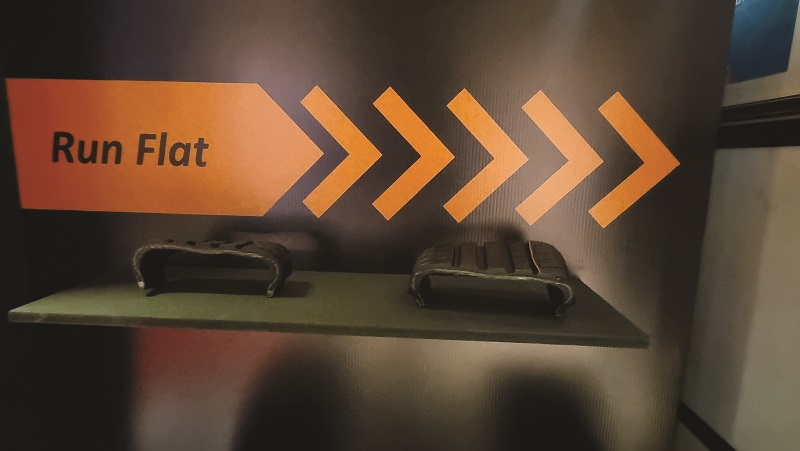 Narayan B added that the company sees this trend not only in passenger cars but also scooter segment, especially in India, where electric two-wheelers is seeing significant uptick. “Our EnergyRide caters to two-wheelers, passenger cars and Winenergy supports commercial trucks and buses. We are the first company to offer a complete EV-centric platform across all vehicle categories,” he said.
Narayan B added that the company sees this trend not only in passenger cars but also scooter segment, especially in India, where electric two-wheelers is seeing significant uptick. “Our EnergyRide caters to two-wheelers, passenger cars and Winenergy supports commercial trucks and buses. We are the first company to offer a complete EV-centric platform across all vehicle categories,” he said.
Vishal Pawar, Senior Vice President – Global Sales & Supply Chain Head, CEAT, revealed that the company currently has around 25 percent market share in the electric two-wheeler segment.
“In the EV ecosystem, we are a leading player, both in OE (original equipment) fitments and the replacement market. However, many consumers do not distinguish between EV and ICE tyres when replacing them. Our marketing efforts include educating mechanics about the differences and best practices for EV tyres. For instance, the Tata Nexon EV was a significant starting point for EV adoption, and now we also supply tyres for the Tata Punch EV, incorporating Calm Technology and foam-based noise reduction. This is an evolving market, and we are positioning ourselves accordingly,” said Pawar.
Right from the start, CEAT worked upon identifying potential failure modes in early development and specifically tested the Calm Technology for such conditions. Issac explained that the adhesive and foam materials have been rigorously validated to withstand extreme conditions, including high-speed driving and water exposure.
“If a tyre requires repair, only a small portion of the foam needs to be removed, and this does not impact the performance. The Calm Technology tyre offers reduction of approximately six decibels in noise, which is a significant improvement. The noise perception is not linear in a vehicle, meaning each decibel reduction translates to a notable difference in actual experience,” said Issac.
Narayanan B added that the idea was to make “these tyres as close to conventional ones as possible, ensuring ease of use for consumers. We have rigorously tested them, and they are designed to deliver tangible value without requiring special treatment from users.”
CREATING AWARENESS
In India, most of the tyre purchase decisions in the aftermarket is heavily influenced by the tyre dealer partner. CEAT too believes that there is a lack of understanding amongst customers in India when it comes to selecting the right kind of tyre for their vehicles, especially in the passenger vehicle space.
For instance, if one asks an average consumer about the speed rating of the tyre, the ideal assumption is that a tyre which fits perfectly. The tyre speed rating is denoted as T, H, V, W, Y or Z – they basically indicate that they are designed to sustain a particular speed.
The company has introduced the ZR-rated tyres that cater to the increasing demand for high-performance vehicles in India, particularly performance-oriented SUVs and sedans that require tyres capable of handling speeds above 220–240 kmph.
The SportDrive SUV tyres feature a dual-layer high-denier nylon overlay to minimise tyre growth at high speeds, enhancing stability and grip, along with a high-denier polyester fabric for durability and the ability to withstand high torque. Available in larger sizes such as 315/40ZR21, 275/45ZR21 and 285/45ZR21, these tyres cater to the super-premium segment.
They have been tested on Germany’s Autobahns and are engineered to meet global standards while being optimised for Indian driving conditions.
CEAT sees export potential in markets such as Europe and Middle East where the demand for high-performance tyres, especially in the 21-inch segment, is quite high.
GROWTH OUTLOOK
CEAT has outlined its ambition of being the second largest tyre manufacturer in the Indian passenger car radial (PCR) segment.
For this, Narayanan B shared that the company is pursuing focus on both premium as well as mass-market segments.
“Our CrossDrive, Secura SUV and Mileage X5 tyres have been well received. Success will come from balancing premium offerings like SportDrive with high-volume products that cater to the broader market,” he shared.
But what about impact of the natural rubber shortage?
Issac shared that at present India witnesses almost 500,000 metric tonnes of natural rubber shortfall and relies on import. The country has a requirement of almost 1.3 million metric tonnes of natural rubber and growing but only around 800,000 metric tonnes is currently produced domestically.
“While initiatives like the INROADS programme aim to boost domestic production, substantial benefits will only be seen post-2030. Until then, securing supply remains a priority,” added Issac.
On the other hand, Narayanan B remains upbeat on the Indian automotive industry’s growth.
“While volume growth remains uncertain, value growth is evident. People are driving more, increasing tyre demand. Despite market fluctuations, we remain focused on moving towards a leadership position in the industry,” signed off an optimistic Narayanan B.
Giti Tire Unveils Next-Generation GitiSportS2+ Following AutoBild Test Success
- By TT News
- March 05, 2026
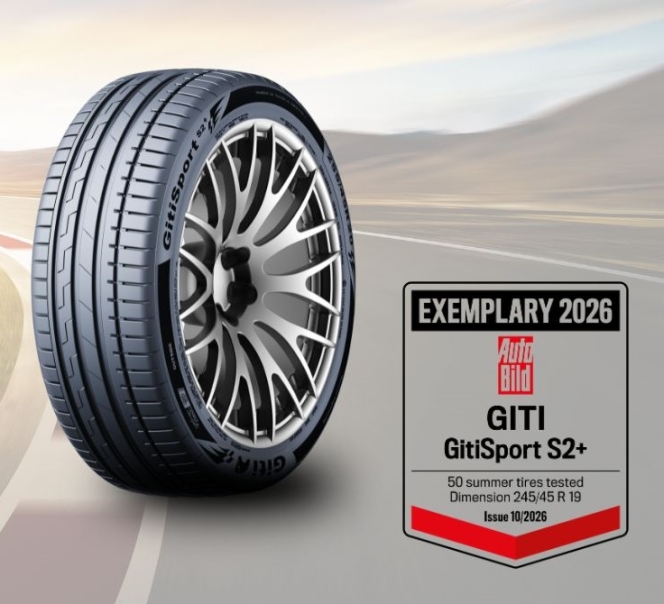
Giti Tire has launched its new ultra-high-performance GitiSportS2+ tyre, following an outstanding result in the AutoBild 2026 Summer Tyre Test, where it received one of the most prestigious independent endorsements in Europe. Rated as exemplary by the leading German publication, the tyre secured fourth place overall out of an initial field of 50 competitors. The evaluation praised its exceptional value for money, impressive driving dynamics and substantial safety margins.
Tested on a BMW 5 Series using the 245/45R19 size, the tyre initially shared fourth position based on wet and dry braking performance, recording a total stopping distance of 42.5 metres. It maintained this high standard across 12 additional assessments, ultimately ranking among the top five alongside several premium manufacturers. The new model is scheduled to be available from spring 2026, launching in 19 sizes covering rim diameters from 17 to 20 inches, widths between 225 and 255 and aspect ratios from 35 to 55.
Designed for sporty cars and powerful SUVs, the GitiSportS2+ features a newly engineered compound that reduces wet braking distances by eight percent and dry braking by two percent compared to its predecessor. It also achieves the highest possible EU Wet Grip label rating of ‘A’. In line with the manufacturer’s broader strategy, the tyre bears the AdvanZtech EV Ready sidewall marking, indicating its compatibility with internal combustion engines, mild hybrids, plug-in hybrids and battery electric vehicles.
During the initial rollout, many existing sizes of the original GitiSportS2 will remain on the market, ensuring continued coverage across the sport vehicle segment. Development took place at Giti’s European R&D Centre in Hannover, with testing and fine-tuning conducted at tracks in UK and Spain. The project leveraged the company’s AdvanZtech technology, a globally integrated research and development system.
Fabio Pecci-Boriani, Deputy General Manager – Product Planning PCR and LTR, Giti Tire R&D Centre (Europe), said, “The new GitiSportS2+ is testimony of the achievements that our engineers, testers and manufacturing facilities have been able to deliver in the area of performance while retaining the sustainability, endurance and mileage criteria that are important to the daily driver. To launch a tyre off the back of an ‘exemplary’ rating in AutoBild is nothing short of sensational; we are thrilled that one of the leading automobile titles in Europe has been able to validate and confirm our latest development and we are excited to share this news with our trusted customers.
“The target criteria for the GitiSportS2+ was to deliver further improvements in dynamic driving, enhanced control on wet roads with precise and exciting control on dry roads, all while maintaining the mileage and energy efficiency of the previous generation. Sportiveness is at the heart of the tyre with a particularly stiff design that contributes to stability at high speeds as well as in cornering. The increased grip performance goes is more precise, firm, predictable and constant.”
Halfords Appoints Jessica Jones As Director Of Fleet Solutions
- By TT News
- March 05, 2026

Halfords has signalled a strategic push into the B2B mobility market by naming a new leader for its fleet division. Jessica Jones is set to become Director of Fleet Solutions from the start of April 2026, tasked with accelerating growth in this area. She arrives with considerable expertise in the fleet, leasing and B2B mobility sectors, having spent her career guiding national account teams and forging strong customer relationships that have driven commercial success.
Her background encompasses strategic fleet management, business expansion and the creation of adaptable service models for corporate clients. Prior to this appointment, Jones served as Sales Director at Sixt UK and held the position of Director of National Fleet Sales at ATS Euromaster. Her recruitment underscores Halfords' commitment to developing its fleet services as a core area for expansion.
The company aims to support businesses by utilising its extensive network of garages to provide integrated maintenance and mobility services. These offerings are designed to maximise vehicle availability and assist companies in controlling operational expenditure.
Adam Pay, Managing Director of Garages at Halfords, said, “Fleet is a significant growth opportunity for Halfords, and Jess brings deep sector expertise alongside a strong track record of building high-performing teams and customer partnerships. As fleets face increasing cost pressures and operational complexity, our national scale and service capability position us strongly to support customers. Jess’s leadership will help us accelerate momentum and unlock further opportunities in this important market.”
Jones said, “I’m delighted to be joining Halfords at such an exciting point in its growth. The business combines a trusted consumer brand with a powerful national servicing network, creating real potential in fleet. I’m looking forward to working with colleagues and customers to build on the strong foundations already in place and further develop a differentiated, customer-focused fleet offering.”
Triangle Tyre Appoints Federico Parmesan As European OTR Technical Manager
- By TT News
- March 04, 2026
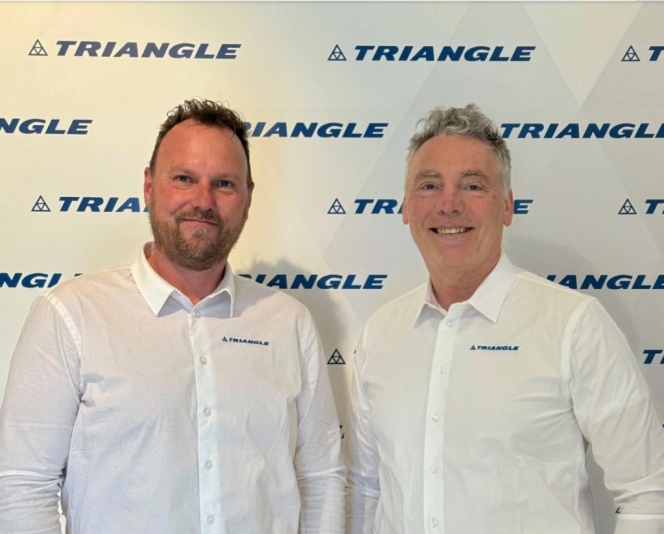
Triangle Tyre has significantly strengthened its European off-the-road operations with the appointment of Federico Parmesan as the new European OTR Technical Manager, a position he assumed on 1 March 2026. This strategic appointment represents a key milestone in the company's ongoing efforts to enhance its technical capabilities and expand its market presence across the continent's specialised tyre sector.
Parmesan brings more than three decades of tyre industry experience to his new role, with particular expertise concentrated in OTR and earthmoving applications. His extensive background encompasses not only deep technical knowledge but also a comprehensive understanding of the challenges faced by dealers and end-users operating in demanding environments. This combination of technical proficiency and practical insight positions him to effectively bridge the gap between product development and real-world application requirements.
In his new capacity, Parmesan will work closely with Triangle's partner network throughout Europe, providing support for both aftermarket and original equipment segments. His responsibilities include strengthening the company's field application expertise and contributing directly to the continued development of the OTR product portfolio. These efforts aim to deliver enhanced value and service to partners across the region.
The appointment reflects Triangle's strategic priority of reinforcing its technical structure to support ambitious growth objectives in the European OTR segment. The company seeks not merely to consolidate its existing market share but to achieve sustainable expansion while elevating support levels for its partners. Parmesan's extensive experience, energetic approach and positive attitude are expected to prove invaluable assets as Triangle pursues these goals and strengthens its position within the competitive European market.
ATF Tyres Appoints Rajesh Vyas As Vice President Of Sales And Marketing
- By TT News
- March 03, 2026

ATF Tyres, one of India’s leading manufacturers of off-highway tyres, has announced the appointment of Rajesh Vyas as its new Vice President of Sales and Marketing. Vyas brings over 25 years of global experience to the role, having worked across diverse international markets to build high-performance sales teams and enhance distribution networks.
His professional background includes leadership roles in brand positioning and product portfolio expansion within competitive sectors. Prior to joining ATF, Vyas served as Vice President at Rubber King Tyre Group. He also held key positions at Balkrishna Industries Limited as Head of Mining Tyres for India and spent a decade at Apollo Tyres Ltd as Business Head for Off-Highway Tyres.
With the company working to expand its footprint in the agricultural, industrial and OTR segments worldwide, Vyas’s strategic leadership and commercial insight are expected to support ATF Tyres in delivering performance-driven solutions across multiple regions.







Comments (0)
ADD COMMENT